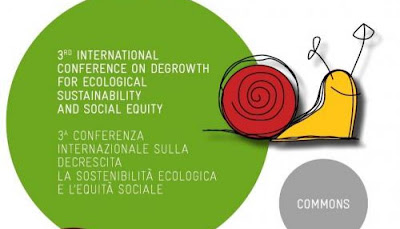Degrowth And Peak Oil
By Ugo Bardi
24 September, 2012
Cassandra's Legacy
This is a condensed version of the talk that I gave at the 3rd international conference on degrowth, in Venice, on Sep 21 2012
 Hello, everybody; I think you came to listen to me today because you want to know something about the situation with crude oil, that is of "peak oil". So, what I can tell you is that the peak has arrived and we are now in the post peak world. It is an event that is taking place slowly, over several years, but I think we can say with reasonable certainty that the petroleum production peak was in 2008.
Hello, everybody; I think you came to listen to me today because you want to know something about the situation with crude oil, that is of "peak oil". So, what I can tell you is that the peak has arrived and we are now in the post peak world. It is an event that is taking place slowly, over several years, but I think we can say with reasonable certainty that the petroleum production peak was in 2008.
To prove what I am telling you I could show you data and graphs, but I think that the best way for you to realize that the peak is past us is to think about how much people are discussing about oil substitutes. You know, all those things that produce flammable liquids that we can use to fuel our cars: biofuels, tar sands, shale oil, you surely heard about all that. And you surely heard about the idea of a "new age of oil," that some say it is coming and that is supposed to be a good thing. But this "new age" is based on dirty resources which have been known for decades (at least) and I am sure you understand that they are expensive, if nothing else by looking at gas prices. Today, we are forced to use these resources exactly because we passed the production peak of conventional crude oil. In this way, we have been able to mask the peak, for the time being, avoiding an obvious decline of production of liquid fuels. In a sense, we acted as those people who try to mask their age by dying their hair. They may succeed in looking younger, but only for a while.
The problem, however, is not so much for how long we'll be able to keep the production of liquids stable; it is that the resources we are using for this purpose have a low energy yield and do tremendous damage to a lot of things. We are destroying enormous areas, poisoning the water aquifers, and forcing agriculture away from food production. More than that, we are increasing the amount of greenhouse gases generated for the same amount of energy produced. Emissions keep increasing and climate change accelerates, as you could see from what happened to the North Pole this year.
So, in a sense, peak oil has been a big disappointment. It was perhaps the first modern appearance of the concept of "degrowth", when it started being discussed some 10 years ago. We expected that the post peak age would have stimulated the development of clean resources and some of us (myself included) thought that it would have saved us from global warming, or at least greatly reduced its importance. But, that has not been the case, unfortunately.
Today, we are discussing another kind of degrowth, intended mostly as a personal choice and most of us seem to believe that it is a good thing. It is an attitude that looks similar to the one we had about peak oil 10 years ago. But is it possible that we are making the same mistake? That is, could we be too optimistic about what degrowth can bring to us?
Let me ask you a question: what problems exactly do you think that degrowth can solve? Maybe you think that degrowing you'll be happier and this may well be. But can degrowth solve the climate problem? Can it reduce pollution and the stress on the ecosystem? Surely, if everyone decided to reduce their consumption, the impact of human beings on the planet would be reduced. But if just some of us decide for degrowth, wouldn't the resources that we don't consume be consumed by someone else? Then, the human impact wouldn't change.
Besides, even if voluntary degrowth were to have a significant effect, would that be enough? Climate change could be irreversible by now, in the sense that we may have unleashed mechanisms that will cause the Earth to keep heating up independently of what we do. Reducing emission or even stopping burning fossil fuels altogether wouldn't stop warming. If this is the case, degrowth alone would not be a solution, just as peak oil wasn't one. Will we need geoengineering to save ourselves? Perhaps, but is geoengineering compatible with degrowth? If our economy shrinks a lot, where would we find the resources needed for geoengineering?
I am not asking you rhetorical questions: I don't know the answers myself. What I know is that we are facing incredibly complex problems. We don't know what kind of solutions might exist for global warming and for ecosystems collapse. We don't even if solutions exist at all. But I think we can say, at least, that it has been growth at all costs that has led us to the quandary in which we are now. Stopping growth surely can't harm us as much!
Ugo Bardi is a professor of Chemistry at the Department of Chemistry of the University of Firenze, Italy. He also has a more general interest in energy question and is the founder and president of ASPO Italia.
Comments are moderated


